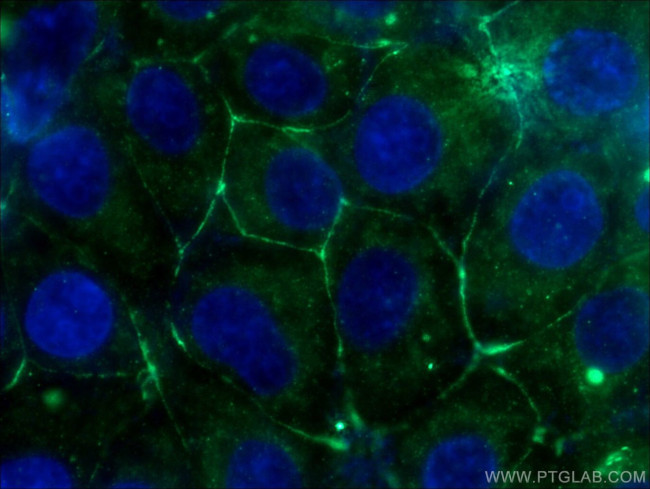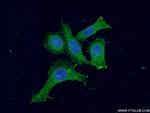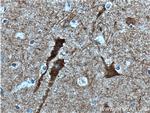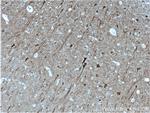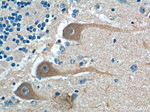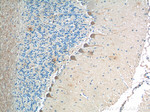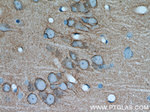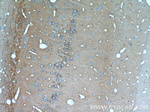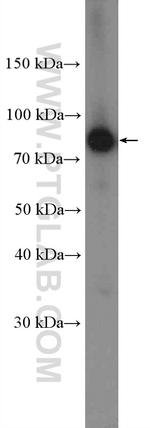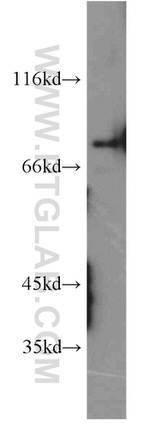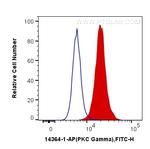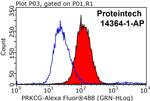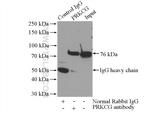Search Thermo Fisher Scientific
Product Details
14364-1-AP
Species Reactivity
Published species
Host/Isotype
Class
Type
Immunogen
Conjugate
Form
Concentration
Purification
Storage buffer
Contains
Storage conditions
Shipping conditions
Product Specific Information
Immunogen sequence: FSFLMVLGK GSFGKVMLAE RRGSDELYAI KILKKDVIVQ DDDVDCTLVE KRVLALGGRG PGGRPHFLTQ LHSTFQTPDR LYFVMEYVTG GDLMYHIQQL GKFKEPHAAF YAAEIAIGLF FLHNQGIIYR DLKLDNVMLD AEGHIKITDF GMCKENVFPG TTTRTFCGTP DYIAPEIIAY QPYGKSVDWW SFGVLLYEML AGQPPFDGED EEELFQAIME QTVTYPKSLS REAVAICKGF LTKHPGKRLG SGPDGEPTIR AHGFFRWIDW ERLERLEIPP PFRPRPCGRS GENFDKFFTR AAPALTPPDR LVLASIDQAD FQGFTYVNPD FVHPDARSPT SPVPVPVM (351-697 aa encoded by BC047876)
Target Information
The PKC family of serine/threonine kinases, including PRKCG (PKC gamma), is activated intracellularly by signal transduction pathways. In humans, at least 12 different PKC polypeptides have been identified. These isoforms differ in primary structure, tissue distribution, subcellular localization, mode of action in vitro, response to extracellular signals, and substrate specificity. PKC alpha, beta I, beta II, and gamma form the conventional family; their activities are Ca2+- and phospholipid-dependent. Protein kinase C can be activated by calcium and second messenger diacylglycerol. PKC family members phosphorylate a wide variety of protein targets and are known to be involved in diverse cellular signaling pathways. PKC also serve as major receptors for phorbol esters, a class of tumor promoters. Each member of the PKC family has a specific expression profile and is believed to play distinct roles in cells. PKC gamma is one of the PKC family members. This protein kinase is expressed solely in the brain and spinal cord and its localization is restricted to neurons. It has been demonstrated that several neuronal functions, including long term potentiation (LTP) and long term depression (LTD), specifically require this kinase. Knockout studies in mice also suggest that this kinase may be involved in neuropathic pain development. Defects in this protein have been associated with neurodegenerative disorder spinocerebellar ataxia-14 (SCA14).
For Research Use Only. Not for use in diagnostic procedures. Not for resale without express authorization.
Bioinformatics
Protein Aliases: PKC-gamma; Protein kinase C gamma type; protein kinase C type I (gamma type); protein kinase C, gamma
Gene Aliases: PKC; PKC-gamma; PKCC; PKCG; PKCgamma; PKCI; Prkc; Prkcc; PRKCG; RATPKCI; SCA14
UniProt ID: (Human) P05129, (Mouse) P63318, (Rat) P63319
Entrez Gene ID: (Human) 5582, (Mouse) 18752, (Rat) 24681

Performance Guarantee
If an Invitrogen™ antibody doesn't perform as described on our website or datasheet,we'll replace the product at no cost to you, or provide you with a credit for a future purchase.*
Learn more
We're here to help
Get expert recommendations for common problems or connect directly with an on staff expert for technical assistance related to applications, equipment and general product use.
Contact tech support
